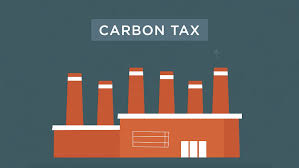Carbon Tax
A carbon tax is a fee imposed on the burning of carbon-based fuels (coal, oil, gas). A carbon tax is the core policy for reducing and eventually eliminating the use of fossil fuels whose combustion is destabilizing and destroying our climate.
Emissions of carbon dioxide and other greenhouse gases are changing the climate. A carbon tax puts a price on those emissions, encouraging people, businesses, and governments to produce less of them. Deterring the burning of fossil fuels is crucial to reducing the accumulation of heat-trapping greenhouse gases in the earth’s atmosphere.
BENEFITS
- Carbon taxes, levied on coal, oil products, and natural gas in proportion to their carbon content, can be collected from fuel suppliers.
- They in turn will pass on the tax in the form of higher prices for electricity, gasoline, heating oil, and so on, as well as for the products and services that depend on them.
- This provides incentives for producers and consumers alike to reduce energy use and shift to lower-carbon fuels or renewable energy sources through investment or behavior.
- They can also raise significant revenue for governments, revenue that can be used to counteract economic harm caused by higher fuel prices.
- Carbon taxes are generally straightforward to administer because they can be piggybacked on existing fuel taxes, which most countries already collect with ease.
- It is also possible to integrate carbon taxes into the royalties paid by coal mining and oil and gas drilling industries.
- Carbon taxes can play a key role in achieving countries’ pledges under the 2015 Paris Agreement, which lays the foundation for international action to combat global warming.
- The decision of the current government to increase fuel taxes as well as quadruple the coal cess is sometimes interpreted as a variant of a carbon tax.
- Only a third of the sharp decline in global oil prices after 2014 was passed on to consumers.
- However, steep price hike due to carbon tax may make such a tax a political issue, especially in a developing country like India, where on the one hand politically influential groups such as the urban middle class or rich farmers are the biggest consumers of energy, and on the other, people emerging out of poverty need access to cheap electricity and fuels.
- The government in India, until recently, has not put in place a carbon tax or cap in the trade system. However, leading Indian companies have set up their own carbon pricing mechanisms following a three-phase process:
In the foundational phase, a company assesses how much carbon it is emitting through greenhouse gas inventories.
In the next phase, the company sets its green vision and identifies an ideal carbon pricing strategy to achieve it. Several pricing approaches are possible including shadow prices, taxes or fees, cap-and-trade and implicit carbon pricing.
Finally, in the roll out phase, the company operationalizes its scheme and sets in place a system to track its effectiveness.
- 40 large Indian companies have priced or are planning to price carbon. Combined, their revenue exceeds $7 trillion.
- The Indian government’s budget for 2020-2021 includes preliminary plans for some form of environmental taxation.

Comments
Post a Comment